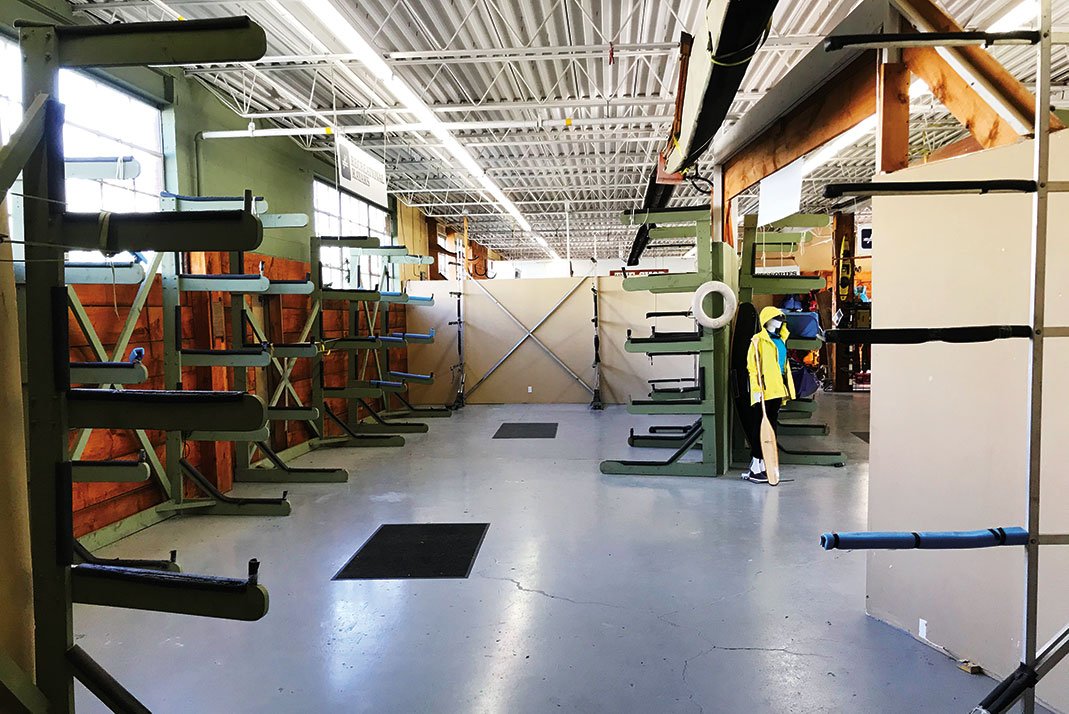What To Do When There’s Nothing To Sell
Photo: The Complete Paddler
What To Do When There’s Nothing To Sell
Written by Jeff Moag
This pandemic has turned the retail game on its head.
Used to be, you waited for customers in a store full of stuff. Now you wait for stuff in a store full of customers. So, what do you do when there’s nothing to sell?
Humans are adaptable creatures, and retail humans more so than most. So naturally they – you – are coming up with creative ways to pass the weeks between inventory shipments.
When he sold out of life jackets, Rob Porter at Just Liquid Sports in Cranbrook, British Columbia, started teaching swimming lessons. Wait, he was just joking about that. The real problem for Porter was finding staff for his mostly-empty store.
“It seems most young enthusiasts wanted to ride the CERB [Canada Emergency Response Benefit] payroll and enjoy their summers,” he says. “To all those people, we wish them luck when applying for jobs in the future.”
Generous unemployment benefits have slowed staffing in the States as well, both on the retail and manufacturing side. It’s one reason all those store shelves are empty—still. Andy Fraden, owner of All Wet Sports in Jacksonville, Florida, says getting inventory this season has been even harder than it was at the height of the pandemic last summer.
“LAST YEAR WAS LOTS OF MOVEMENT BUT WE FOUND A WAY TO KEEP STOCK. THIS YEAR WHAT LITTLE WAS REPLACED BY WHOLESALERS AND DISTRIBUTORS IS LONG GONE.”
“Last year was lots of movement but we found a way to keep stock. This year what little was replaced by wholesalers and distributors is long gone,” he says.
“It’s crazy! So this year we just sell what we got! Need any whistles?”
If only everyone was lucky enough to have a full supply of $3 plastic whistles. Judging by mid-pandemic photos from inside many retailers across North America, the smart play might have been turning those empty store aisles into a bowling alley. So far we haven’t heard of any retailers being quite that resourceful.
Industrious retailers have found ways to keep busy, however. Simon Coward and his management team at Aquabatics Calgary got on the horn with new suppliers from around North America and the world, hunting for inventory. “We created new relationships with manufacturers we hadn’t worked with, and that is proving to be really valuable in the long run,” he said.
That may not be as fun as an inter-staff bowling tournament on aisle 3, but it’s probably better for the bottom line. Coward’s crew also logged more river time than usual, including staff training to build on-water skills and get familiar with whatever products were still on the shelves. The level of in-house Croakie expertise soared.
Aquabatics also implemented an entirely new inventory management system and integrated it with the website. “We produced content—videos, how-to’s, blog posts, where to’s. We leaned into Paddling Maps like crazy,” Coward says. “It is now paying off with huge increases in organic traffic and building our visibility on social media channels.”
That’s perfect, because social media is where plenty of paddling store employees are hanging out these days. After all, you can’t play Solitaire on a cash register. Can you?
This article was first published in the 2022 issue of Paddling Business. Inside you’ll find the year’s hottest gear for canoeing, kayaking, whitewater and paddleboarding. Plus: Industry leaders on surviving COVID, the dirty little secret of pro deals, brand consolidation and more. READ IT NOW »

